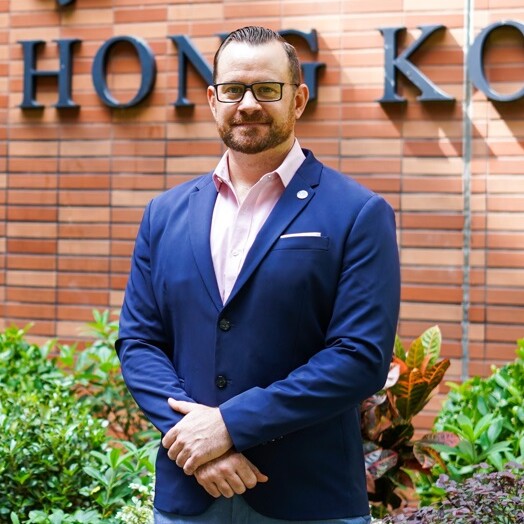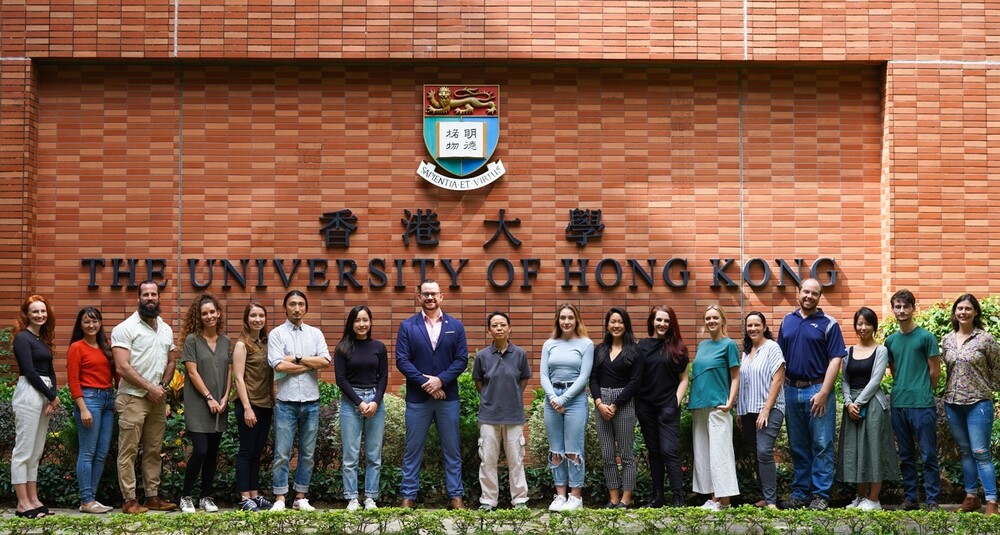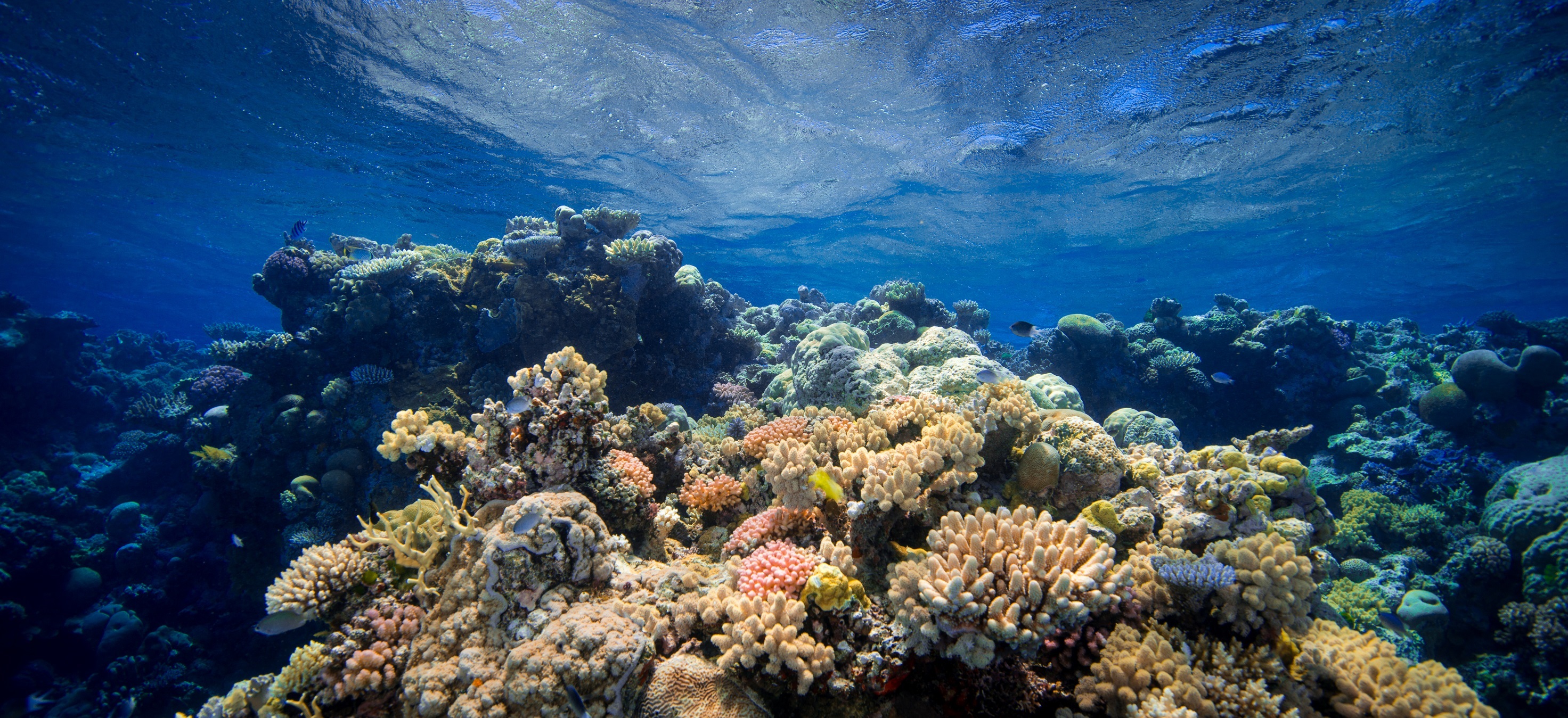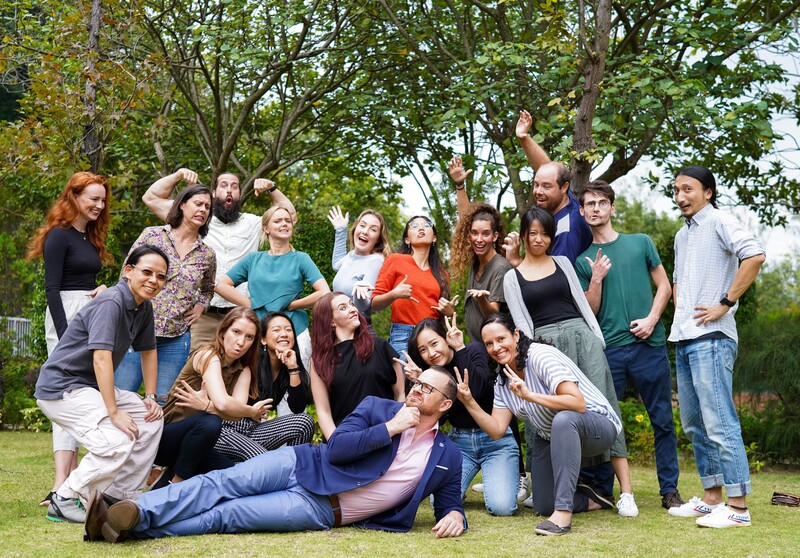 | Dr David BAKER Associate Professor School of Biological Sciences
Website: www.thelifeisotopic.com |

1. What do you think are your most significant research accomplishments, and what has been the impact of your research?
I have worked on a variety of research topics, from the nature of marine symbioses to wildlife trade and environmental restoration. I am proud of my team’s accomplishments in all areas. We have shown that climate change can turn a coral’s symbiont into a parasite. This knowledge tempers our hopes that corals can be ‘engineered’ to withstand climate change. A symbiotic partner could be a ‘fair weather friend’ - meaning they are only cooperative with their host when the environment is just right. There are many parallels to explore across the kingdoms of life, from forests to the human gut.
At the same time I contribute to a team effort at HKU called ‘Conservation Forensics’, led by Dr Caroline DINGLE, which is aimed at intelligence gathering, surveillance, and developing enforcement tools to combat illegal wildlife trafficking, while better understanding the impacts on wildlife populations themselves.
Finally, we are embarking on an ambitious effort to contribute to ecosystem restoration. With colleagues from the Swire Institute of Marine Science, we represent ‘MarineGEO - Hong Kong’, the first global earth observatory for biodiversity and ecosystem functioning in all of Asia. Through this effort we are learning more about our local environment — discovering new species — and their functional role in our local ocean. Moreover, we lead a global investigation of the marine sediment microbiome and its role in modulating ‘Blue Carbon’, the potential for the oceans to sequester CO2 to mitigate climate change. This effort dovetails with exciting technologies developed at HKU which led to the spin-off company ‘archiREEF, Ltd.’, which is supported by TSSSU, iDendron, and IncuTech. We are excited to discover how 3D printing eco-friendly structures can enhance both biodiversity and ecosystem functioning as we prepare Hong Kong and China for a warmer and wetter future.
2. Please briefly descript 1 - 2 ongoing research projects that best reflect your visions in the scientific field.
Much of my team’s time is spent on MarineGEO. We completed an Environment and Conservation Fund (ECF) project to conduct a preliminary survey of Hong Kong’s marine areas with an emphasis on Tolo Harbour. Through that work, we quantified the biodiversity of myriad marine flora and fauna, including discovering new species and new species records for Hong Kong, as well as detected an alarming array of human pathogens and health risk factors like antimicrobial resistance genes. Together with Dr Shelby MCILROY, we are supervising a number of student projects examining the coral symbiosis. This work relies heavily on our University’s stable isotope laboratory, where we make detailed measurements of resource exchanges between the coral host and their symbiotic microbes.
3. What is the most important question you want to address?
If you build it, will they come? We want to know how structural complexity enhances marine biodiversity — the totality of living organisms in a habitat. We predict that there will be an optimal level of complexity that fosters the ‘best’ diversity under a given condition. Ultimately we aim to provide insights as to the cost-benefit of environmental protection and ecosystem restoration. Through our CRF project, we also want to know how local stressors like sewage, sediment, and aquaculture wastes alter marine communities. Such information is essential knowledge for our local policy makers to make informed decisions about the future management of our natural resources, and so that our environment has a holistic accounting of its inherent value in terms of genetic wealth and ecosystem services.
4. Can you give an example of your translational work?
Conservation Forensics has been very rewarding in leading to direct and tangible impacts on society. We were the first to identify an illegal trade route of critically endangered European eels through Hong Kong. This contributed evidence to an international law enforcement investigation and prosecution of those involved. Subsequently, we conducted a city-wide survey of eel products that revealed a shocking proportion of illegally sourced eels in our retail sector. Essentially, we are all being fed mislabelled food that is pushing a once common species towards extinction. Today, local NGOs are working with distributors to enhance their surveillance of their suppliers. More recently, I am increasingly interested in science entrepreneurship for our talented young minds. archiREEF, Ltd., led by PhD student Vriko YU, is a fine example of this bringing not only exciting products to the market but coupling that with best practices in restoration ecology guided by our scientific knowledge. The timing is excellent, as the world grapples with the pandemic and re-thinks matters pertaining to Environment, Social, and Corporate Governance (ESG). Indeed, this is emblematic of the University’s aspiration to generate knowledge with real-world impact.

5. Where do you see yourself in five years/ ten years? What do you want to accomplish the most?
I see myself at HKU! I am trying to use my post-tenure time to support students pursuing non-academic careers and my untenured colleagues. First, I am really enjoying thinking more about translational ecological research and how our graduates are well positioned to capitalise on environmental entrepreneurship in the Greater Bay Area. I support several startups ranging from food testing to urban farming. Moreover, I am the Director of the University’s Stable Isotope Ratio Mass Spectrometry Laboratory (SIRMS). SIRMS is supported by the Faculty of Science as a Central Facility — the only open-access analytical facility of its kind in all of China, if not Asia. Thanks to support from the University Research Committee (URC) Small Equipment Grant and a CRF Equipment Grant, SIRMS has grown to offer a wide range of services to internal and external clients. Stable Isotope Analysis (SIA) can add impact to research beyond ecology and environmental sciences. We are working across faculties, including Medicine and Social Sciences, to enhance their research impact. We offer free consultations and even pilot sample analysis to anyone interested in including SIA in their grant proposals.
Finally, I have recently stepped into a new role as Departmental Research Postgraduate Committee Chair in School of Biological Sciences (SBS). I enjoy playing the ‘game’ of recruiting the best students locally and internationally. Backed by my diverse colleagues in SBS — we have what I would argue as the most diverse research group in Asia with staff and students from up to 20 different countries at any given time. I enjoy overseeing our School’s recruitment which now includes competing for our incredible HKU-PS fellowships as well as the HKPF. Ultimately, I hope that my small contributions help improve HKU and solidify our legacy in SBS/SWIMS as the best program in the Eastern Hemisphere!
6. How would you bridge the gap from your research to research users?
Outreach is very important. Before the pandemic, my team was always undertaking outreach activities either through SWIMS or the SBS. We have provided advice and consulting on museum exhibits, including the spectacular ‘Wonders of the Ocean’ at the IFC mall, which featured a full-sized replica of a Blue Whale — the largest animal to have ever lived on Earth! This exhibit featured many specimens from the Hong Kong Biodiversity Museum, curated by Dr Benoit GUÉNARD from SBS. Moreover, with the recent re-opening of the expanded and refurbished SWIMS, there are exciting opportunities on the horizon for engaging the public on our research. With respect to entrepreneurship, stay tuned! There are many exciting developments on the horizon that will see our HKU-supported research having translational impact on the private sector.
7. What are the challenges you are facing?
We are all facing challenges pertaining to change. HKU must change and adapt for the future and all of us within the institution must be open-minded. This is easier said than done. I have come to realise the value of serving on various committees is to meet other colleagues from different faculties, departments and non-academic units and share a common goal. It is too easy to fall into the e-mail trap. Getting to know others in person helps to find common ground. I started to realise that we all face many similar problems that are deeply entrenched in the history of HKU. I recently attended the Executive Vice-President’s ‘we Serve’ forum and was encouraged by the message of unity and plans to improve and modernise the campus through stakeholder engagement and incremental change.
8. Who has influenced you the most?
I have been most influenced by my postdoc mentor, Marilyn FOGEL. Not only is she a titan in the field of biogeosciences, but she is an incredible human being who has spent her life fighting against a male-dominated world, and now, in addition to that, fighting a debilitating disease. As a disabled woman in science, she is an important role model for all of us. She had to break one glass-ceiling after another and never sacrificed her family or personal relationships. As a scientist, she is fearless and never shied from new tools, methods or research questions. She has worked from the arctic to the tropics and made impacts in space science. I am in awe of the scope of her achievements, both professional and personal, and aspire to nurture those values in my own research group.
Indeed, I have had three incredible female mentors in my life. I don’t think I would be the scientist I am today without being inspired by them. With that in mind — we ALL lose when we bring biases against others into the workplace. I see these biases alive and well are everywhere. Although we have strong internationalisation, there is a persistent problem with poor gender balance and equity. Men have an important role to play in recognising and fixing this problem.
9. How would you go about motivating yourself when you are going through a low point?
Hong Kong is a very high-paced society and HKU is no shelter. The work-life balance is extremely challenging here, especially so in academia compared to other overseas universities. It is critically important to carve time for oneself. When I need motivation, it usually means I have been pushing too hard. Physical activity can give my mind a reprieve. I enjoy weightlifting and paddle boarding when I can. I have two young kids at home and spending time with them and in our tiny home garden helps me to unplug and recharge.
10. Can you tell us more about your research group? What are the roles and the missions?
I do my best to support a vibrant research team, which depends on supporting several postdoctoral leaders. I recruit postdocs who have skills that I lack, in areas like molecular ecology, genomics, and bioinformatics. When merged with my skillset in biogeochemistry, we get great results. I try to empower my postdocs to lead our main research projects, and also try to support their pursuit of their own research questions. This sets good examples for collaboration amongst our corps of research postgraduates (RPGs), research assistants and undergraduates. Indeed, I see my research group like a pie whereby everyone shares their slice with someone else. Sharing, collaboration, and camaraderie enhance productivity. It’s a ‘rising tide raises all ships’ approach that I think works quite well. Each career stage has a role in mentorship. Postdocs mentor RPGs and RPGs mentor undergraduate researchers. No one works in isolation.


